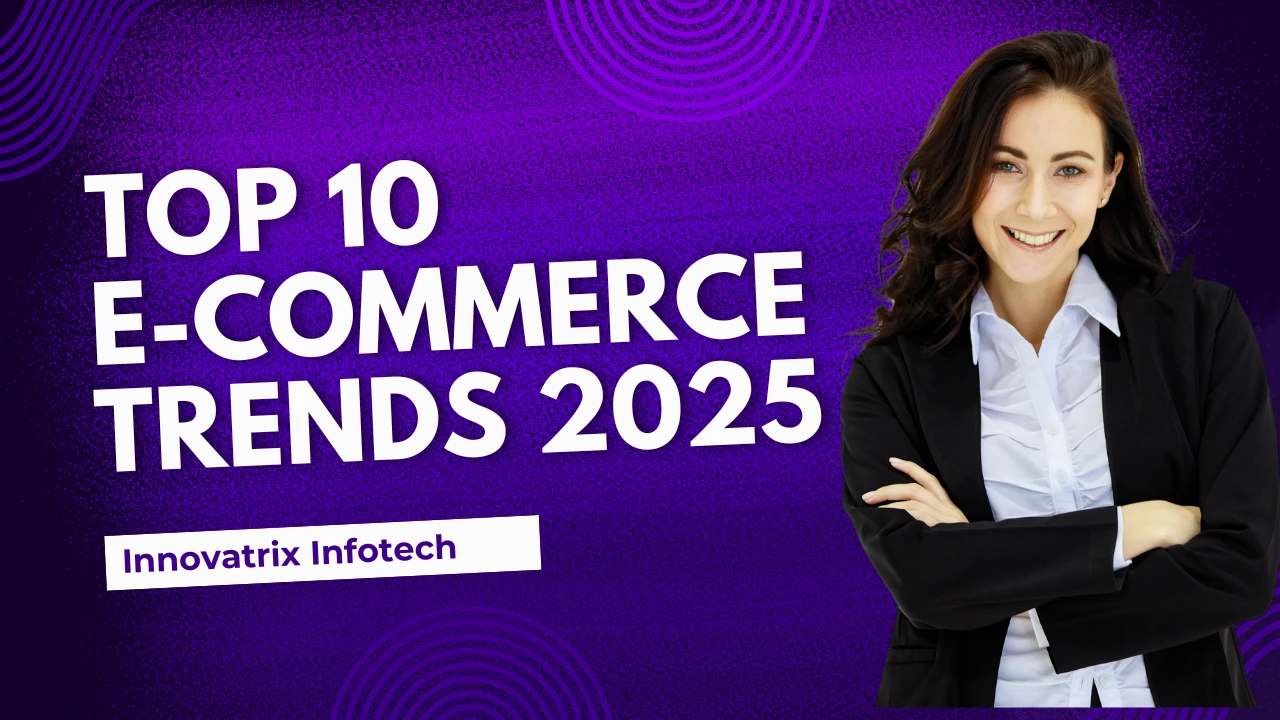Table of Contents
Top 10 E-Commerce Trends That Will Dominate in 2025
Headwinds of e-commerce drift towards artificial intelligence and leave trails of global light in the digital ecosystem!
E-commerce is an evolving organism of the digital environment that leeches on innovation and technology gathered over past decades. It is becoming all-prevalent in the coming years, encompassing automation and predictive analytics. According to experts, the e-commerce industry will climb up to $8 trillion by 2027 from $6 trillion in 2025. Fierce competition between online retailers revolves around offering exceptional services and products.
From understanding customer preferences to automatically understanding buying potential, everything is becoming core parameters to thrive in a digital world. However, online selling through multiple channels is becoming the e-commerce trend in 2025 across the digital ecosystem. According to research, 73% of e-commerce stores use more than three channels to sell their products and services.
Consequently, the growth paradigm of e-commerce gained momentum with omnichannel sales and purchases. Today, over 95% of entrepreneurs are directing their investments towards AI in e-commerce for redefining seamless shopping experiences. With the rapid transformation in consumer behaviour, the role of augmented reality and machine learning has become immense.
In this blog, we will discover the top 10 e-commerce trends that will dominate in 2024. By the end of this read, you will know the digital commerce work dynamics and selling strategies for the coming years.
Top 10 E-commerce Trends That Will Dominate in 2025
1. AI and Machine Learning
Artificial Intelligence is the developing computer programming language that can understand human thoughts. The heart of innovation is now reliant on AI in e-commerce, in the form of smart devices, voice assistants, accelerated decisiveness, or automated responsiveness. Machine learning is streamlining the pathway for AI in e-commerce.
The incorporation of algorithms, research insights, data understanding, etc. improves the perceptions, actions, and cognition of computer systems. Neural networks in computer programming are a core component of machine learning. However, the future of online shopping will become hassle-free with the inclusion of AI and machine learning in digital shopping.
E-commerce stores today are powered by AI that can analyze customer behavior, product recommendations, and marketing campaigns. The integration of AI chatbots, virtual assistants, and social e-commerce platforms in one place is revolutionizing the growth potential. In addition, AI in e-commerce allows online stores to manage inventory; fraud detection, predictive analytics, etc. helping e-commerce have a competitive advantage.
2. Augmented Reality (AR) Shopping
According to Statista, the number of consumers who are using augmented reality in shopping will grow by 4.3 billion in 2025. The need to visit physical stores is getting reduced with the growth in the use of AR in e-commerce sites. Lenskart, the popular e-commerce store, allows consumers to try on 3-D spectacles so that they can select them according to their face.
Sephora is a prominent example of using augmented reality in e-commerce. The online Sephora store allows customers to try foundation shades and lipstick colors through AR. IKEA is a popular e-commerce store for furniture that introduces AR to create 3-D replicas of living spaces with selected furniture. The benefits of augmented reality in shopping are enormous.
From an enhanced shopping experience to a distinctive interactive shopping experience, everything improved with augmented reality. Augmented Reality (AR) shopping tends to increase purchasing power and reduce cart abandonment. In addition, AR has the ability to set a brand apart and increase conversion rates in 2025.
3. Voice Commerce
Voice assistants are becoming a fundamental part of online shopping. The simplification of user interaction is becoming possible with voice assistants. Popular voice assistants are Gemini, Siri, Alexa, Google Assistant, etc. Voice commerce is the major e-commerce trend in 2025 that is dominating the digital ecosystem. Natural Language Processing is making the use of voice assistants easier in e-commerce.
In addition, the future of online shopping is becoming more convenient with the speech recognition ability of e-commerce. In speech recognition, technology tends to convert spoken words into digital forms that computers can understand. It is incorporated through Amazon Echo, smart speakers, Google Home, etc.
Therefore, voice commerce is relentlessly growing due to hands-free shopping and convenience. It is observed that voice search queries are often becoming more conversational and will help to streamline SEO. E-commerce, which is equipped with voice assistants has a higher tendency to dominate the digital world.
4. Sustainable Practices
Eco-consciousness is significantly increasing in every domain. E-commerce stores that prioritize eco-friendliness have higher chances to grow. Following sustainable practices is an e-commerce trend in 2025, as it is becoming a non-negotiable aspect of business growth. With the inclusion of AI in e-commerce, marketing campaigns have become sustainable. E-commerce businesses are becoming responsive by significantly using recycled and biodegradable packaging material.
Green consumerism aims to align the shopping experience with requirements and manufacturing potential. Furthermore, the future of online retail will revolve around recycling, minimum waste, reduction in carbon footprints, etc. Prominent brands that focus on sustainability and ethical e-commerce are Lush Cosmetics, Ecosia, Warby Parker, etc. For instance, Lush Cosmetics offers unpacked products to reduce the use of practices and Warby Parker uses eco-friendly materials in eyewear manufacturing.
Sustainability in e-commerce not only improves the business value but also manages the carbon emission rate and logistics. Brand development that resonates with natural development and customer value is the future of online retail. The circular economy models are part of e-commerce development updates, as they amplify the use of renewable technologies in manufacturing processes.
5. Social Commerce
Social media platforms like Facebook, Instagram, LinkedIn, Pinterest, etc. led to a 360-degree shift in the marketing sector. The sales channel of e-commerce stimulates social commerce platforms. It allows brands to sell directly to consumers without directing them to any type of external website. In addition, social commerce platforms leverage vast audiences for e-commerce development financially.
The integration of social commerce platforms with authentic websites enables a seamless shopping experience. The prominent feature of social commerce like in-app checkout for quick and efficient shopping. The creation of engaging content for e-commerce on social media helps to run targeted ad campaigns. Moreover, collaboration with influencers is now becoming highly popular.
6. Subscription Models
Subscription box services are the fantasy of online shoppers. Millennials are the biggest advocates of subscription models, with an increased demand for e-commerce platforms. Most adopted models owe the feathers of predictability, personalization, and convenience. Online sales technology is on a rapid shoot, with a CAGR of 65.8 percent during the 2024-2025 tenure.
The jotted benefits of recurring revenue streams for e-commerce models are a sparking edge for digital commerce trends.
- Recurring revenue sales are predictable; hence, there is better cash flow.
- Gives a boost in cross-selling and up-selling
- Help in imparting lifetime customer value
- Valuable data insights and access to more customers
Headspace, Rentomojo, and FabBag are lively examples of subscription-based e-commerce models. FabBag has allowed you to explore the beauty industry through convenient features and affordable prices. Headspace has beautifully organized the sector by providing mindfulness sessions and meditation exercises. Lastly, the Rentomojo subscription model offers rental furniture. Yet the gap is big and you can hit e-commerce trends in 2024.
7. Multi-Channel Integration
Multi-channel shopping experiences comprise all kinds of customers, both online and offline. The use of multi-channel marketing is a next-gen e-commerce strategy to ensure a seamless user experience. The ultimate is to make the brand consistent across all channels, mitigating geographical barriers. However, multi-channel shopping experiences are e-commerce development updates that make user interaction smooth and efficient.
The multi-channel shopping strategy encompasses the deployment of advanced data, consistent messaging across social media platforms, streamlined online and offline interactions, etc. Recent e-commerce trends in 2024 involve the use of CRM systems to manage inventory, interactions, and customer-based marketing.
For multi-channel integration, enterprises can use platforms such as Shopify Plus, custom APIs, BigCommerce, etc. These platforms not only boost multi-channel shopping but also provide exceptional shopping experiences.
8. Payment Innovations
Online shopping innovations have a wide landscape to empower e-commerce payment, such as blockchain, BNPL (Buy Now, Pay Later), the Internet of Things (IOTs), and augmented reality. Who else is not here fond of transparent transactions? The payments ecosystem will facilitate more rewarding and trustworthy gestures as digital commerce trends. Cryptocurrency serves as a decentralized digital ledger that enables security and transparency. It not only secures the transactions but also transforms the supply chain management.
There are multiple benefits of cryptocurrency, such as lower transaction fees, cross-border transaction feasibility, and faster processing time. End-to-end encryption is beneficial for e-commerce in 2025 as it ascends real-time tracking. In addition, e-commerce technology advancements like cryptocurrency and Ethereum help provide an audit trail of transactions that will detect inappropriate transactions easily.
New forms of credit are growing fast and giving a major hit to online sales technology. The contactless digital wallet allows you to make payments via smart devices within a flow of seconds. The contactless technology will be a massive boon for e-commerce trends in 2024. Wherein looking at these changes, consumer behavior is a major game in the e-commerce conclave.
9. Video Marketing
Customer trust acts as a bearing pearl for the enhancement of digital commerce. Video marketing is becoming the cornerstone for reaching out wider audience. Social commerce platforms are majorly used for creating shoppable videos, live streaming, and short content like Instagram reels or YouTube shorts. E-commerce companies that are investing in video marketing have seen a surge in ROI.
In video marketing, enterprises showcase their products and services through demonstrations and tutorials for digital success. Entrepreneurs can use storytelling to create an emotional connection with the buyers. The inclusion of clickable links in videos tends to drive higher direct conversions. Tips for video marketing campaigns:
- Keep videos short and compelling
- Ensure that videos are mobile-friendly
- Use high-quality visuals and sound
- Include a clear Call-to-Action (CTA)
Video marketing also gives clarity about the product and services. Thereby, e-commerce stores should invest in video marketing immensely to dominate the world of digital marketing.
10. Data-Driven Decision Making
Data-driven decision-making reshape the domain of e-commerce trends in 2024. Proper management of businesses requires the proper use of data-driven decision-making strategies to ensure aligned work dynamics. It helps to gain insights into customer behavior and preferences. Popular tools for data analytics are CRM systems, Hotjar, Adobe Analytics, and Google Analytics.
The objective of data-driven decision-making is to analyze the vast amount of data, behavior, and recent trends. It will enhance the custom-based experience and online sales techniques. Technologies like predictive analytics increase choice management and optimization of inventory. Effective use of data-driven decision-making tools bolsters customer engagement and financial growth.
Data-driven tools enable precise targeting and personalization. In addition, the future of online shopping becomes aligned with inventory optimization and pricing strategies. For actionable insights, focus on tracking and user interactions. Hence, the use of data-driven tools are authoritarian strategy to reach out maximum audience.
Conclusion
E-commerce has always been a sweet applause for business owners and a sweet lump for online shoppers. The rapid increase in e-commerce development updates is working as a comprehensive framework for future methodology. Developing an online shop is now an easy job for underprivileged business families. It is all about creating an online presence and scattering the aura of your product. E-commerce is a futuristic pass for upcoming business owners. Deliver a bye to physical storefronts; avail expansion without relocation with e-commerce platforms in 2024. We help you form an A-to-Z e-commerce presence, including marketing strategies, at Innovatrix Infotech!
Stay ahead of the curve by incorporating these trends into your e-commerce strategy. Let’s make it happen – schedule a consultation with Innovatrix Infotech today!”
You can contact Innovatrix Infotech through this email: contact@inno.mugglemode.com
Mobile phone: +91-7003215657, +91-6283401341



